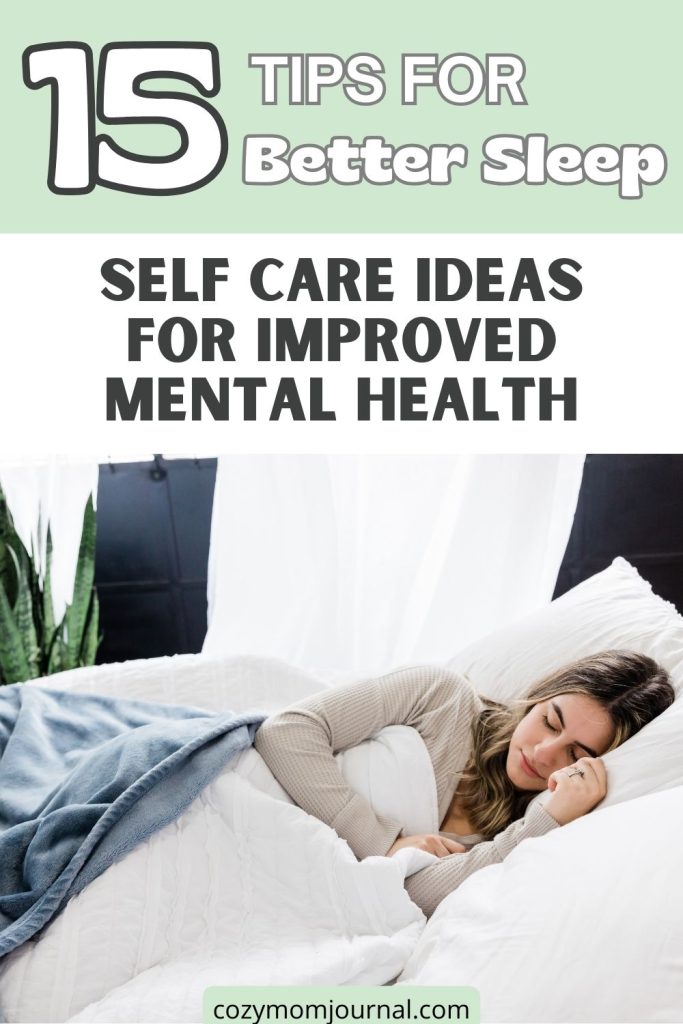Discover 15 effective tips for better sleep. Explore self care ideas that enhance mental health and ensure a restful night. Perfect for moms needing quality sleep.

15 Tips for Better Sleep: Self Care Ideas for Improved Mental Health
Ever notice how everything seems a little tougher after a bad night’s sleep? That’s because sleep is crucial for our health and well-being. Especially for mothers, who juggle countless daily challenges, getting quality sleep can make a world of difference. So, how can you ensure you’re getting the rest you need? Here are 15 tips to help you sleep better, incorporating self care ideas that also boost your mental health.
1. Regular Sleep Schedule
Setting a consistent bedtime and wake-up time, even on weekends, helps regulate your body’s internal clock. Try to stick to this schedule, even if it means sacrificing late-night TV or weekend sleep-ins. Consistency is key here.
2. Comfortable Sleeping Environment
Your bedroom should be a sanctuary. Ensure it’s cool, dark, and quiet. Invest in a comfortable mattress and pillows that support your body well. Sometimes, small changes like blackout curtains or a white noise machine can make a big difference.
3. Relaxation Techniques – Tips for Better Sleep
Before bed, practice relaxation techniques such as meditation, deep breathing, or progressive muscle relaxation. These methods help calm your mind and prepare your body for sleep. Apps like Headspace or Calm offer guided sessions if you need a bit of help getting started.
4. Physical Activity
Regular exercise can do wonders for your sleep quality. Aim for at least 30 minutes a day, but try to avoid vigorous activity right before bedtime. Evening walks or gentle yoga can be great ways to wind down without overstimulating yourself.
5. Healthy Diet – Tips for Better Sleep
What you eat and drink can significantly affect your sleep. Avoid caffeine and heavy meals in the evening. Opt for a light snack if you’re hungry before bed – something like a banana or a small bowl of cereal can be just enough.
6. Limiting Electronic Devices
The blue light emitted by phones, tablets, and computers can interfere with your sleep. Aim to reduce screen time at least one hour before bed. Instead, engage in relaxing activities like reading a book or listening to soothing music.
7. Establishing a Bedtime Routine
Creating a consistent evening routine signals to your body that it’s time to wind down. This could include activities like taking a warm bath, reading, or practicing gentle stretches. A calming routine can make it easier to transition from wakefulness to sleep.
8. Limited Napping During the Day
If you need a nap, keep it short – 20 to 30 minutes in the early afternoon is ideal. Long or late naps can interfere with your nighttime sleep, making it harder to fall asleep when you really need to.
9. Avoiding Alcohol and Smoking
While a nightcap might make you feel sleepy, alcohol can disrupt your sleep cycle and reduce sleep quality. Similarly, nicotine is a stimulant that can keep you awake. It’s best to avoid these substances, especially in the hours leading up to bedtime.
10. Stress Management – Tips for Better Sleep
Incorporate time management and stress-relief techniques into your daily life. Activities like journaling, yoga, or even talking to a friend can help manage stress levels. Reducing daily stress can make it easier to fall asleep and stay asleep.
11. Herbal Remedies and Natural Supplements
Consider herbal remedies like chamomile tea or lavender oil to help you relax. Melatonin supplements can also be useful, but it’s best to consult with a healthcare provider before starting any new supplement regimen.
12. Children’s Sleep Habits – Tips for Better Sleep
If you have kids, their sleep habits can affect yours. Establish a consistent sleep routine for them to ensure everyone in the house gets a good night’s sleep. This might include a set bedtime, a quiet wind-down period, and a comforting bedtime routine.
13. Partner Support
Communicate with your partner about your sleep needs. Whether it’s sharing nighttime responsibilities or creating a quiet environment, having support can make a big difference. Don’t hesitate to ask for help when you need it.
14. Medical Advice – Tips for Better Sleep
If you have persistent sleep problems, consult a specialist. Conditions like sleep apnea or insomnia require professional treatment. Your doctor can provide tailored advice and interventions to help improve your sleep quality.
15. Be Patient with Yourself
Improving sleep habits takes time, so be patient with yourself. You don’t have to implement all these tips at once. Start with one or two changes and gradually incorporate more over time. Remember, progress is more important than perfection.
Conclusion – Tips for Better Sleep
Better sleep is within reach with these practical self care ideas. Start by trying out a few tips and see what works best for you. Over time, you’ll find that quality sleep not only boosts your physical health but also enhances your mental health, making you feel more energized and ready to tackle each day. For more self care ideas and mental health tips, explore other articles on our blog.

For more self care tips CLICK HERE!
Or check my Pinterest board about Self Care & Beauty Tips!


